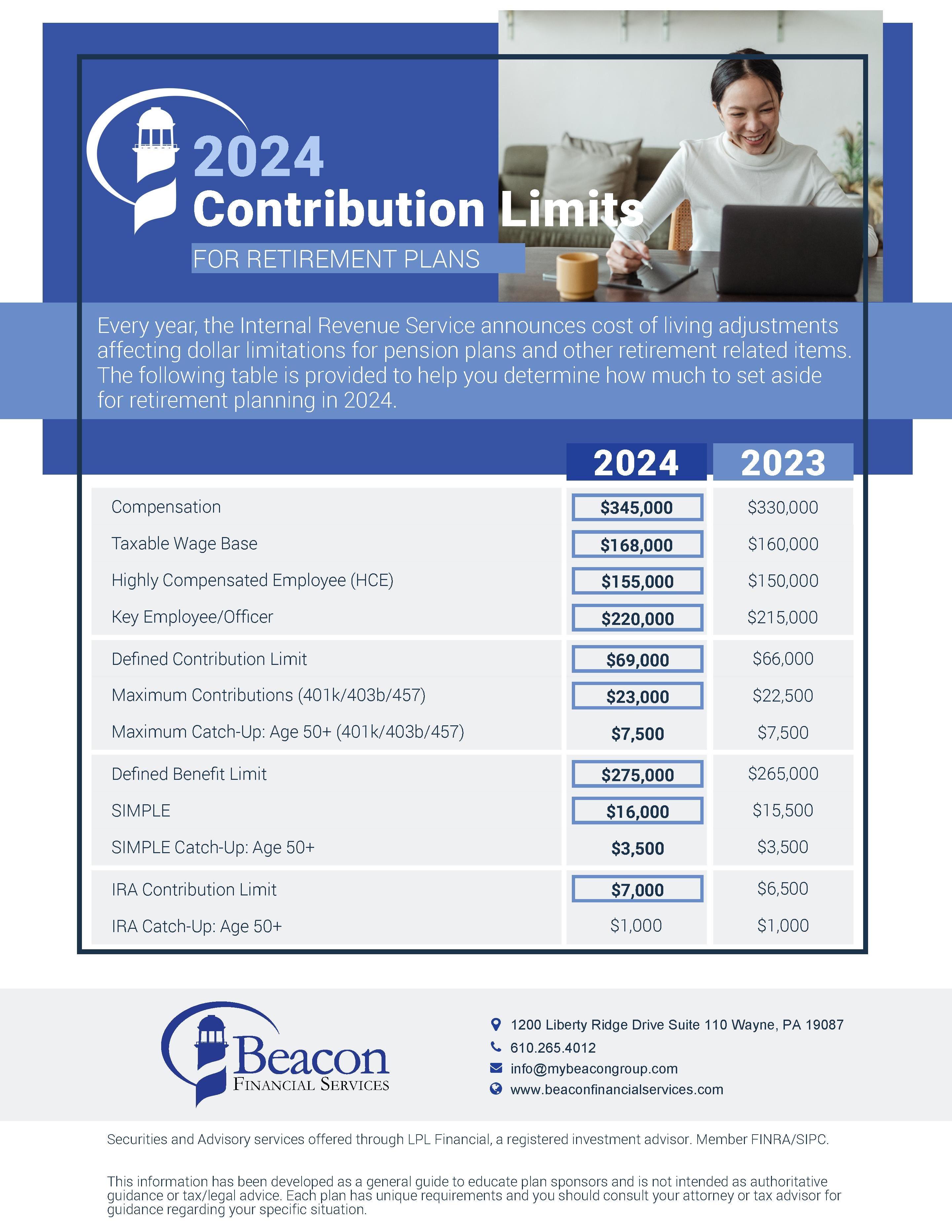IRS Announces Modest Changes To Retirement Plan Contribution Limits

The 2024 Contribution Limits for Retirement Plans can be found here.
Beacon Financial Services
In response to the current inflationary environment, the Internal Revenue Service announced a modest increase in the maximum contribution limits for 401(k)s and Individual Retirement Accounts for 2024. This year, 401(k) savers can contribute a maximum of $23,000, marking an increase of over 2% from the $22,500 limit set for 2023. The new contribution limit, effective from January 1, 2024, applies to 401(k) plans, along with 403(b) plans, most 457 plans, and the Thrift Savings Plan for federal employees.
Despite being less than the nearly 10% limit increase implemented for 2023, the latest increase allows employees to set aside more pre-tax money into their 401(k), thus potentially lowering their annual income tax payments.
The catch-up contribution for employees aged 50 and above, however, will remain unchanged at $7,500 for 401(k), 403(b), most 457 plans, and the Thrift Savings Plan, allowing employees aged 50 or older can contribute up to $30,500 in 2024. For employees participating in SIMPLE plans, the catch-up contribution limit also remains at $3,500 for 2024.
Roth IRA Contribution Limits
For those investing in Roth IRAs, the contribution limit is increased to $7,000 in 2024, a 7.6% increase over the $6,500 limit set in 2023. The catch-up amount for those aged 50 and above continues to be capped at $1,000.
However, Roth IRA contributions are dependent on household income. For 2024, individuals and heads of households with incomes between $146,000 and $161,000 must limit their Roth IRA contributions. Those with incomes above $161,000 cannot contribute to a Roth IRA. For married couples filing jointly, the phase-out range is set between $230,000 and $240,000.
MORE FOR YOU
Other Retirement Plan Contribution Changes for 2024
The 457(b) contribution limit will increase from $22,500 in 2023 to $23,000 in 2024. 457(b) plans have unique catch-up contribution rules that may allow additional contributions depending on individual circumstances and plan provisions.
The contribution limits for SIMPLE IRA and SIMPLE 401(k) will also rise. From $15,500 in 2023, the limit will increase to $16,000 in 2024. SEP-IRA contribution limits will increase to $69,000 per year for 2024, up from $66,000 in 2023.
For single coverage, the HSA contribution limit will rise from $3,850 in 2023 to $4,150 in 2024. For family coverage, the limit will increase from $7,750 to $8,300, while the $1,000 catch-up contribution for individuals aged 55 and above remains the same.
Healthcare FSA contribution limits will increase from $3,050 in 2023 to $3,200 in 2024. It’s important to note that different types of FSAs (such as dependent care FSAs) may have different limits.
Practical Impact
WASHINGTON, DC – JANUARY 11: Director of the National Economic Council Lael Brainard speaks during … [+]
Getty Images
While these increases may be modest, they are critical in keeping up with the pace of inflation. They are essentially cost-of-living adjustments designed to maintain the real value of retirement savings in an inflationary environment. By adjusting for inflation and increasing contribution limits, the IRS is helping individuals maximize their retirement savings and secure a financially stable future.
The IRS adjustments for 2024 reflect an economy where inflation rates, although cooling, are still warm. These changes are part of the tax code’s yearly changes to account for inflation, which includes IRS adjustments for tax brackets, standard deduction amounts, and other provisions for tax year 2024.
A Vanguard report found that just 15% of plan participants maxed out their contributions in 2022. So, while the majority of plan participants will likely remain under the contribution limit in 2024, it is wise for all participants to understand the importance of keeping pace with inflation in retirement planning, which, in this case, means revisiting contribution levels and considering adjustments if appropriate.
Remember, these IRS announcements pertain to the tax year 2024; the affected returns will be filed in 2025. As always, it is recommended that individuals consult with a financial advisor or tax professional to understand how these changes may affect their financial situation.
Brian Menickella is the founder and managing partner at Beacon Financial Services, a broad-based financial advisory firm based in Wayne, PA.
Securities and Advisory services offered through LPL Financial, a registered investment advisor. Member FINRA/SIPC.
This material was created for educational and informational purposes only and is not intended as ERISA, tax, legal or investment advice.

Comments are closed.